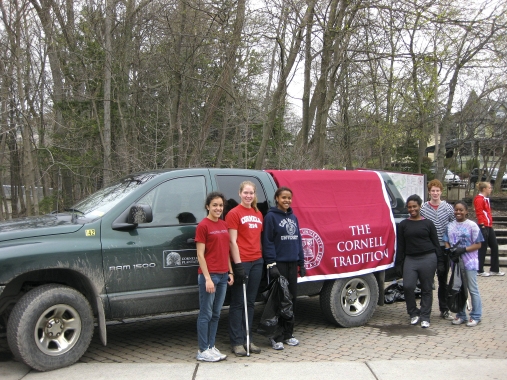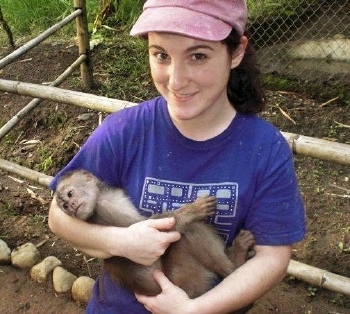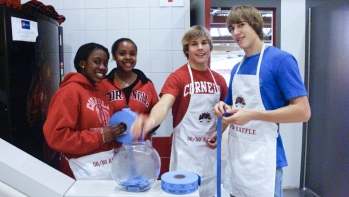WORTH SUPPORTING
$15 million gift supports financial aid for Cornell Tradition fellows

During the spring 2011 semester, Cornell Tradition fellows teamed up with Cornell Plantations staff to clean up trails and other accessible locations in Cascadilla Gorge. From left, fellows Neesha Schnepf, Elizabeth Martens, Roberta Gomez, Nia Hall, Vincent Cusma and Candice Hilliard.
Like most Cornell undergraduates, Cornell Tradition fellows are hardworking, smart and ambitious. What sets them apart is how they spend their free time. During the 2010–11 academic year, the 500 fellows worked more than 60,000 hours and completed 45,000 hours of campus and community service.
They cleaned trash off the Ithaca Commons and out of the gorges. They tutored elementary and middle school students in reading and math, staffed Ithaca Youth Bureau events, visited senior citizens, planted trees and rooftop vegetable gardens, packed groceries for the needy, built houses in Guatemala and fed monkeys on a wildlife preserve in Ecuador.
This June, The Atlantic Philanthropies, one of the world's largest charitable foundations, announced that it would give Cornell $15 million for the financial aid costs of Cornell Tradition scholars, 75 percent of whom qualify for aid. Since financial aid to Tradition scholars amounts to more than $12 million per year, Atlantic's gift will cover more than one-third of the cost between now and 2014.
The Cornell Tradition, along with the Meinig Family Cornell National Scholars and the Hunter R. Rawlings III Cornell Presidential Research Scholars, is part of The Cornell Commitment. The three programs are largely funded by alumni gifts and recognize, reward and encourage a select group of promising or accomplished students.
For Tradition fellows, hard work is encouraged. All fellows work 100-150 hours per academic year at paying jobs and donate their time to help others through 100-150 hours of campus and community service per academic year.
In a June 15 letter to President David Skorton, Jeff Lamontagne '91 credited the Cornell Tradition with instilling a habit of public service in him that has lasted 20 years: "The Tradition left no room for excuses. I had to integrate service into my college life; at first, this was difficult, but after a semester or two, it seemed natural."

Cornell Tradition fellow Rebecca Zuckerman in Ecuador. See larger image
In 2002, after four suicides at a high school near Lamontagne's home in Colorado, he and a friend organized a fundraiser to help pay for counseling services for students at the school. Lamontagne later founded Second Wind Fund, a nonprofit that has grown under his leadership to be one of the largest providers of counseling services for youth in the state; it has served 2,800 children, none of whom have been lost to suicide.
"I can draw a direct line from the Cornell Tradition to the formation and growth of Second Wind Fund," Lamontagne wrote to Skorton. "With my busy life, new child and lack of experience in this field, I don't think I would have put energy into this endeavor unless I had truly, fully integrated community service into my life at Cornell."
Kristine M. DeLuca, director of The Cornell Commitment, hears many such stories. "Our research, as well as our informal contacts with our alumni, demonstrate that this infusion of service into our graduates' lives is taking hold."
According to a 2005 survey, Tradition alumni are more likely to lead political campaigns, community organizations, and professional and religious associations than non-Tradition alumni peers.
Shanna K. Johnson '13 of Houston wouldn't be at Cornell if it weren't for her Tradition fellowship. "My senior year of high school, there was talk in my family of me not being able to go to college at all," Johnson says. But when the university offered her a generous aid package that included the Tradition fellowship, "Cornell ended up even cheaper than my state school."
Johnson has held as many as four jobs at once, including usher, veterinary science class coordinator and lab technician. She also volunteers hundreds of hours at the Tompkins County SPCA. "I've been pre-vet my entire life," says Johnson. "When I finish treating elephants," she explains, "I want to go into teaching."
Tradition fellow Jamie Lynn Roden '12, a biology major in the College of Agriculture and Life Sciences from the Albany, N.Y., area, spent her sophomore winter on a Guatemala coffee bean farm helping a family of 10 harvest their crop, dropping coffee cherries into a basket strapped to her waist. Roden works at the library and as curriculum support specialist for Cornell's Upward Bound program, which provides college-readiness training to low-income and first-generation college students in the Ithaca area. Like Johnson, Roden hopes to become a teacher.

Cornell Tradition fellows sell 50/50 raffle tickets at a Cornell Big Red men's hockey game. See larger image
"There's a ripple effect of requiring students to be active," explains Jacob Sneva, Cornell Tradition director. "We want to connect them to the university and to the habit of reaching out and making a difference in communities, whether it's the campus community or one far away in another country."
The Tradition's ideals mirror those of Atlantic, which aims "to bring about lasting changes in the lives of disadvantaged and vulnerable people." In fact, the Cornell Tradition was established through a gift from Atlantic in 1983. All told, Atlantic has awarded $600 million to Cornell and $5.4 billion in grants worldwide since it was created by Chuck Feeney '56, co-founder of Duty Free Shoppers Group and inventor of duty-free shopping at airports.
By 2020, Atlantic will give away the remainder of its wealth, making it the largest foundation in history to spend all its endowment. Last May, at a gathering of billionaires who have signed on to Bill and Melinda Gates' and Warren Buffett's "Giving Pledge" – a promise to give away the majority of their personal wealth – Buffett called Feeney the "spiritual leader" of the movement, adding, "He wants his last check to bounce."